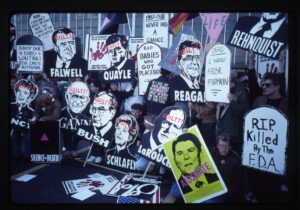Guest high school blogger uses UC Berkeley Oral History Center interviews to write about Funding and Federal Authority in AIDS Research and Treatment. This is part three of a 3-part series. Resources for teachers are at the end of the article.
Obstacles in AIDS Research and Treatment: Funding and Federal Authority
By Ella S. Damty
Sophomore, El Cerrito High School
As with any disease or scientific endeavor, research on AIDS required money. The federal government at the time didn’t have an efficient system to approve funds for projects that desperately needed it, like AIDS. This difficulty was compounded by the fact that funds might not be approved at all, because federal officials weren’t always convinced that AIDS was an important disease to research. Medical researchers had to work with little to no funding or equipment to research and treat AIDS until the first federal funds were approved by Congress in 1983.
Don Abrams, an oncologist studying AIDS, describes his experience writing a grant proposal for the National Institutes of Health, and the bureaucratic mistakes that delayed his funding. He recalls that his grant proposal was lost and put into the wrong category, so instead of being weighed against the six other applicants for the program he applied to, it was considered with hundreds of others for a different type of grant.
In addition to navigating slow federal bureaucracy, researchers had to contend with the government’s belief that AIDS wasn’t a lasting or serious disease. Their proposals weren’t always reviewed because for several years they were seen as a waste of time. Art Ammann, a specialist in pediatric AIDS, explains,
Again, who was going to review [an application for AIDS research funds] if most people didn’t believe that this epidemic was a problem to begin with? So grants got rejected and individuals had to reapply—maybe a two-year process. So research on AIDS was done initially by people who had funding which they could use flexibly…. A federal funding mechanism didn’t get built until people accepted AIDS as a disease, and the government put money into that area. (Ammann, 64)

When the federal government finally realized that AIDS was an important disease to research, the grantors (such as the NIH) wanted to maintain control over both the funds and the researchers because of the money and awards that could be earned. But, as Marcus Conant, the dermatologist who first diagnosed Kaposi’s Sarcoma in AIDS patients, describes, “The problem with that is that when the government retains control, it by definition slows down the process. There are very few examples where the government’s been in control of something that has moved rapidly.” (Conant, 152)
Conant goes on to describe a specific instance where quicker funding could have made a difference in thousands of lives: Jay Levy, the doctor who developed the HIV antibody test, had put in a request for funding to get a fume hood, so that he could work with viruses. Had he gotten it, he could have been the first to discover the virus months earlier, and developed the antibody test sooner. The number of AIDS cases caused by blood transfusions could have been greatly reduced if blood could have been tested sooner.
Through their oral histories, medical researchers show how government bureaucracy and reluctance to fund AIDS research greatly slowed the efforts to find a cause and a treatment for the devastating disease. But these oral histories also show that doctors and researchers did the best they could and valiantly soldiered on, saving thousands of lives.
Photo: AIDS protest at Federal Drug Administration offices in Washington, DC, 1988. (UC San Francisco, Library, Special Collections. Source: Calisphere)
Resources for Teachers
Student project: See the website by Ella S. Damty, based on the class assignment developed by UC Berkeley undergraduate research apprentice Corina Chen: Virus Hunters Newsletter: Obstacles in AIDS Research and Treatment
Education resources, including how-to on interviewing, tips for searching our collection, and the complete AIDS/HIV curriculum with sample assignments.
Seven-episode podcast: First Response: AIDS and Community in San Francisco.
All interviews in the AIDS Epidemic in San Francisco Oral History project.